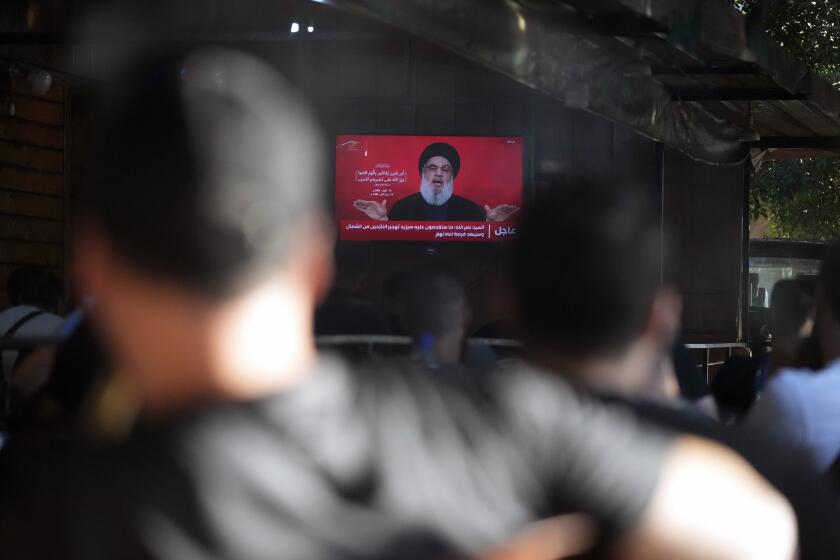Troop plan fueling insurgency, Sunni says
President Bush’s plan to send 21,500 more troops to Iraq has inflamed passions among the restive Sunni Arab minority, bringing new recruits to insurgent cells and outpourings of popular anger toward the U.S., the spokesman for the country’s most hard-line Sunni clerical group declared Sunday.
“Iraq is like a fire,” said Mohammed Bashar Faidi, spokesman for the Muslim Scholars Assn. “Instead of putting water on the fire, Bush is pouring gasoline.”
The association, which says it represents thousands of clerics throughout Iraq, shares the aims of the Sunni Arab insurgency. But it also reflects the views of a significant segment of the Sunni Arab population, which has largely turned to Islamic political ideologies since the downfall of the secular Arab nationalism represented by Saddam Hussein’s regime.
During a 90-minute interview in his Amman office, Faidi voiced views that illustrated the seemingly unbridgeable gulfs between Iraq’s Shiite Muslim-led government, the Sunni guerrilla movement fighting it and the U.S., which in the long term hopes to draw down its troops without permitting Iraq to slip further into sectarian civil war.
Victory predicted
Faidi welcomed war, which he predicted his side would win. He advocated a step-by-step withdrawal of U.S. troops, which he said would allow armed nationalist Sunnis to rout the Iranian-linked Shiite militias and political groups that are a major component in the country’s violence.
Even the prospect of a wide-scale proxy war between Iranian-backed militias and Sunni fighters aided by sympathetic Persian Gulf countries would be an improvement over the status quo, he said.
“It would be a civil war,” he said. “But we believe the militias and the [current] Iraqi army [are] not fighting for an ideology or their nation but for Iran. The resistance is fighting for their nation and its beliefs. We would bring [civil war] to an end and restore order in three to four months. At the end things will be calm, better than living for four years under the American government and the Iranians.”
Faidi’s boss, Harith Dhari, widely considered the most influential Sunni religious figure in Iraq, has dismissed the current Iraqi government as a puppet of Iran, a largely Shiite nation. Both Muslim scholars left Baghdad for Amman months ago, in part to escape the potential wrath of Shiite militias. In November, the Iraqi government issued a warrant for Dhari’s arrest on charges of collaborating with the insurgency after he made televised comments justifying its attacks.
Iraqi Prime Minister Nouri Maliki and other Shiites charge that the association justifies acts of sectarian violence by insurgents colluding with foreign extremists. Faidi said the association was barely able to resist mounting pressure by rank-and-file Sunnis to issue a fatwa, or religious edict, calling upon young men throughout the Muslim world to join the struggle in Iraq should the U.S. military increase operations in Sunni neighborhoods of Baghdad.
“This is exactly what Al Qaeda wants, which we don’t want,” he said.
‘Another adventure’
Faidi denounced Bush’s troop increase proposal as “another adventure” that will cause “more bloodshed, more dislocated families, and more distrust” between Iraqis.
“It will not solve problems,” he said. “It will increase the complexities.”
Instead of escalating the U.S. troop presence in Iraq and increasing reconstruction spending, Faidi said, Bush should “start from zero” by scrapping the current Iraqi security forces and restoring the Hussein-era army, dismantling the government elected in December 2005, discarding the constitution approved in an October 2005 referendum and shifting the U.S. alignment to Sunnis, who dominated under Hussein, instead of Shiites.
“Give the Sunni its place back,” he said.
Faidi said Sunni guerrillas and their supporters were heartened by what they saw as recent conciliatory gestures by Americans, including calls for a withdrawal of U.S. troops by 2008 in a report spearheaded by former U.S. Secretary of State James A. Baker III and former Rep. Lee H. Hamilton (D-Ind.).
Some welcome troops
Some Sunnis, especially those living as minorities in mixed areas such as Baghdad and Baqubah, grudgingly welcome the prospect of more American troops as a measure of protection against Shiite militiamen and a way to decrease what they call Iranian influence.
But Faidi said Bush’s calls for increased troops had only roused suspicions of imminent offensives on Sunni districts of Baghdad and Al Anbar province and spurred a sudden “mobilization” among Sunnis, according to clerics and prayer leaders who contacted him by telephone from Iraq.
He said it was too late for the Americans to win over the insurgents.
“The issue is trust,” he said. “If there was trust, all the issues could be resolved.”
More to Read
Sign up for Essential California
The most important California stories and recommendations in your inbox every morning.
You may occasionally receive promotional content from the Los Angeles Times.










